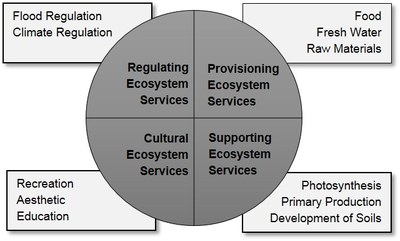Ecosystem Services
Ecosystem services are the benefits humans obtain either directly or indirectly from ecosystems, i.e. fresh water, food and climate regulation. Human well-being is inseparable from ecosystems.
Throughout human history, people have altered their environment in order to create more favorable conditions for their survival. These impacts were moderate as long as population density was low and technological development was modest. However, they have expanded dramatically since new technology allowed the population to grow and to increase the impact over most of the earth's surface.
Today we are faced with a situation in which fossil resources are rapidly being depleted, and there is growing demand for goods and services provided by ecosystems in order to meet the needs of modern societies.
The key question in the context of natural resource consumption is how much of these resources ecosystems can generate and whether there are limits to the rates at which they can be renewed.
This is where the concept of ecosystem services is used as a tool to provide a basis for a holistic view on the role that ecosystems play for human well-being. This requires the quantification of ecosystem functions and processes, and the value of these functions needs to be determined from a human perspective. Such an exercise poses an enormous challenge, because natural sciences, social sciences and economics have to integrate successfully.
 |
Suggestions for the implementation of this concept have been developed in large, international projects like the Millennium Ecosystem Assessment (2005) and the TEEB study on "The Economics of Ecosystems and Biodiversity" (2010). Four basic types of ecosystem services were distinguished in these projects:
|
Provisioning ecosystem services are the “products” of ecosystems, i.e. food, raw materials or fresh water.
Regulating ecosystem services include for example the regulation of floods and climate.
Cultural ecosystem services are aesthetic and psychological aspects of the environment that are linked with cultural experiences and human well-being. Recreation, aesthetic and educations are some of them.
Provisioning, regulating and cultural ecosystem services are based on supporting ecosystem services. In the Millennium Ecosystem Assessment, supporting ecosystem services were e.g. photosynthesis, primary production of autotrophic organisms or the development of soils which are a prerequisite for agriculture and forestry.
